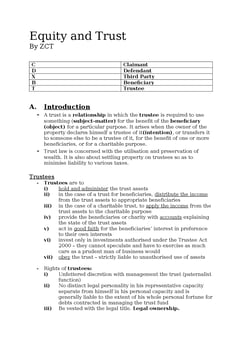T Choithram International SA v Pagarani [2000] UKPC 46; [2001] 1 WLR 1
Judgement for the case T Choithram International SA v Pagarani
Table Of Contents
KEY POINTS
Gift effectiveness relies on the donor's clear intent, proper delivery, and recipient acceptance. For a gift to be valid, especially one involving significant assets or creating a foundation, formal documentation is essential.
When a donor creates a foundation and appoints himself as a trustee, he retains control and oversight. While this can ensure alignment with the donor's vision, it can also lead to potential conflicts of interest.
An oral statement that a donor gave all his wealth to a foundation indicates intent but lacks formal legal weight. For significant gifts, written documentation is typically required to solidify the donor's intention and avoid disputes.
If gifted property remains vested in the donor, it suggests that the gift is not completed. For a gift to be effective, the donor must relinquish control and ensure that the property is transferred to the recipient or trustees.
FACTS
-
Thakurdas Choithram Pagarani (“The Donor”), seriously ill in England, signed a trust deed in the presence of others, including the following (“Defendants”):
T Choithram International SA,
Bytco International SA
Bholenath Inc
Mahadev Inc
Kishore Thakurdas Pagarani
Lekhraj Thakurdas Pagarani
Ramesh Pohumal Thanwani
Ramchand Dharmadas Rajwani
Vashdev Lalchand Pamnani
-
This deed established a philanthropic foundation, with the Donor as one of the trustees.
The Donor then orally declared he was giving all his wealth to the foundation, including deposit balances and shares in the first to fourth Defendants, British Virgin Islands companies.
He directed the company's accountant to transfer these assets to the foundation.
-
Later that day, the Donor announced at board meetings that he had established the foundation and gifted his wealth to it.
Resolutions were passed recognizing the foundation's trustees as the holders of the deposit balances and shares.
However, while the books of the first Defendant were updated to reflect the foundation as a creditor, similar changes for the second Defendant and the transfer of shares were not completed before the Donor's death.
After his death, the companies registered the foundation's trustees as shareholders and issued new share certificates.
Plaintiffs, claiming entitlement to the Donor's estate, filed suit in the High Court of the British Virgin Islands.
-
The court held that the Donor hadn't made a valid gift of the deposit balances and shares to the foundation.
The Court of Appeal upheld this ruling.
The Defendants appealed to the Judicial Committee, seeking to overturn the lower courts' decisions.
JUDGEMENT
-
The court allowed the appeal, reversing the decision of the Court of Appeal of the British Virgin Islands.
It held that the Donor intended to make an immediate and absolute gift to the foundation, not a conditional or revocable one.
Though his words seemed like an outright gift, in context, they meant a gift of trust to the foundation's trustees, according to the trust deed.
-
The court noted that when one trustee holds the trust property, they must transfer it into the names of all trustees.
While the donor didn't fully vest the gifted property in all trustees, he couldn't retract his declaration of giving property to the trust.
Therefore, the property was vested in the Donor as trustee, completing the gift.
-
The deposit balances and shares in the four companies, included in the Donor's gift to the foundation, were held in trust by the foundation's trustees.
This meant that the transfer of these assets after the Donor's death was valid, confirming the completion of the gift.
The court reversed the earlier judgment, validating the foundation's claim to the Donor's assets.
COMMENTARY
-
The case of Thakurdas Choithram Pagarani is about the importance of clear intent, proper delivery, and recipient acceptance in the context of gift-giving, particularly when large assets and foundations are involved.
Gift effectiveness relies heavily on formal documentation to avoid ambiguity and disputes, as seen in the dispute over whether the donor's oral declaration of gifting all his wealth to a foundation constituted a valid transfer of assets.
This case illustrates the complexities surrounding philanthropic gifts and the importance of clarity, proper legal processes, and timely execution.
It serves as a reminder that when establishing a foundation or making significant gifts, donors should ensure all necessary steps are taken to avoid ambiguity and potential legal disputes after their passing.
For Further Study on T Choithram International SA v Pagarani
Need instant answers? Our AI exam tutor is here to help.
Ask questions 🙋 Get answers 📔 It's simple 👁️👄👁️
Our AI is educated by the highest scoring students across all subjects and schools. Join hundreds of your peers today.
Get StartedSimilar Cases
Related Product Samples
These product samples contain the same concepts we cover in this case.

